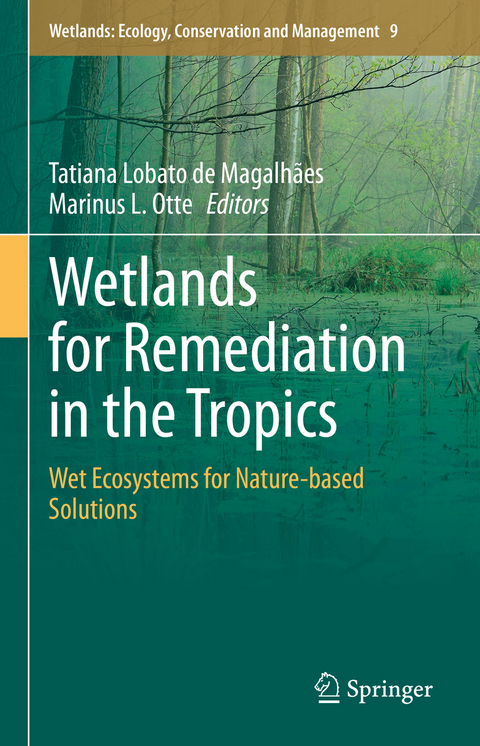
Wetlands for Remediation in the Tropics
Springer International Publishing (Verlag)
978-3-031-23664-8 (ISBN)
This edited volume provides a review of remediation approaches utilizing aquatic and wetland macrophytes in the Tropics. This form of phytotechnology has exceptional potential as a sustainable nature-based solution, but that potential is not commonly utilized in the Tropics. Constructed wetlands for improvement of water quality are cost-effective, offering affordable solutions for remediation in warm and tropical regions worldwide. The robustness, simplicity, and reliability of treatment wetlands provide efficient long-term operation.
Wetlands for Remediation in the Tropics covers theory, provides case studies, and identifies gaps in our current understanding. It highlights why the Tropics differ from temperate regions in this context, particularly concerning differences in climate and species diversity and abundance. Urban, rural, and industrial examples are discussed across 11 chapters. These nature-based solutions, including the concept of 'Sponge City',can be applied to tropical areas worldwide and incorporated particularly in highly urbanized regions.
The authors, from Argentina, Australia, Brazil, Canada, Colombia, the USA, the Netherlands, Mexico, Pakistan, and Taiwan, all have substantial research experience using wetlands for remediation.
The topic of this book is relevant not only to scholars and academics but also to practitioners and government officials from developing countries, where scarce resources and a lack of a qualified workforce are common, but large differences exist in history, culture, regulations, climate, water fluctuations, and vegetation. Although ideas based on experiences from temperate regions can be applied, the Tropics require distinct approaches to developing constructed wetlands for remediation.
lt;p>Dr. Tatiana Lobato de Magalhães is a research professor at the Universidad Autónoma de Querétaro, QRO, Mexico, and has specialized in wetland research and education for more than 10 years, with a strong focus on ecology, genetics, and distribution of aquatic plants. Her work includes research projects and teaching across the Americas, including the Amazon and Southern Brazil Highlands. She was awarded the 2021 Academic Merit medal by UAQ, the 2019 José Mariano Mociño (1757-1820) medal by the Mexican Society of Botany, and the 2018 Research Fellow Wetland Ambassadors by the Society of Wetland Scientists. She is an associate editor of an international book series and scientific journals (Wetlands, Aquatic Botany, Wetland Ecology, Management, and Conservation), and chapter chair at the Society of Wetland Scientists. Tatiana is recognized by the National System of Researchers in Mexico (2020-2024) and certificated as a professional wetland scientist by PCPSWS (2020-2025).
Dr. Marinus L. Otte is a professor at North Dakota State University, Fargo, ND, USA, and has specialized in wetlands research and education for more than 30 years, with a strong focus on pollution and phytoremediation. His research, teaching and outreach on water and wetlands has involved projects around the world, most recently in Mexico as a Fulbright Specialist. He is a lifetime member of the Society of Wetland Scientists, and has been the editor-in-chief of the scientific journal Wetlands since 2012. He published about 100 peer-reviewed scientific articles and contributed to many conferences world-wide.
Chapter 1. A brief history of phytoremediation using wetlands (Marinus L. Otte).- Chapter 2. Phytoremediation using tropical wetlands: Are temperate treatment wetlands sound models? (Daniel Campbell).- Chapter 3. Tropical and subtropical plant species used for phytoremediation in treatment wetlands (Hernán Ricardo Hadad).- Chapter 4. Wetlands for bioremediation in Pakistan (Muhammad Afzal).- Chapter 5. Urban wetlands in the tropics - Taiwan as an example (Wei-Ta Fang).- Chapter 6. Treatment of urban stormwater through constructed wetlands - experiences and practical guidance for tropical and non-tropical settings (Swapan Paul).- Chapter 7. Phytoremediation of agricultural pollutants in the Tropics (Megan L. Murray).- Chapter 8. Wetlands to treat mining tailings in the Tropics of Central and South America (Aurora M. Pat-Espadas).- Chapter 9. Bioremediation and biofuel production using microalgae (Wei-Ta Fang).- Chapter 10. Wetlands for remediation in Africa: Threats and opportunities (Oscar Omondi Donde).- Chapter 11. Cost and benefits of treatment wetlands in the Tropics (Marco A. Rodríguez-Domínguez).
| Erscheinungsdatum | 28.01.2023 |
|---|---|
| Reihe/Serie | Wetlands: Ecology, Conservation and Management |
| Zusatzinfo | IX, 216 p. 1 illus. |
| Verlagsort | Cham |
| Sprache | englisch |
| Maße | 155 x 235 mm |
| Gewicht | 525 g |
| Themenwelt | Naturwissenschaften ► Biologie ► Genetik / Molekularbiologie |
| Naturwissenschaften ► Biologie ► Ökologie / Naturschutz | |
| Schlagworte | 1.Aquatic plants • 1. Aquatic plants • 2.Contaminants • 2. Contaminants • 3.Phytotechnologies • 3. Phytotechnologies • 4.Constructed wetlands • 4. Constructed wetlands • 5.Wastewater wetlands • 5. Wastewater wetlands • 6.Macrophyte • 6. Macrophyte |
| ISBN-10 | 3-031-23664-5 / 3031236645 |
| ISBN-13 | 978-3-031-23664-8 / 9783031236648 |
| Zustand | Neuware |
| Informationen gemäß Produktsicherheitsverordnung (GPSR) | |
| Haben Sie eine Frage zum Produkt? |
aus dem Bereich


